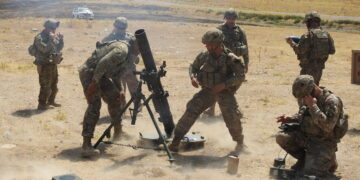April 4, 2019
EXPLAINER: The Saudi-UAE-led intervention in Yemen’s civil war undermines U.S. security interests
FOR IMMEDIATE RELEASE:
April 4, 2019
Contact: press@defensepriorities.org
WASHINGTON, DC—Today, Congress voted to end U.S. military support for the Saudi-UAE-led coalition intervention in Yemen’s civil war. For more information on the Yemen crisis, view the Defense Priorities explainer and one-pager.
THE SAUDI-UAE-LED INTERVENTION IN YEMEN’S CIVIL WAR UNDERMINES U.S. SECURITY INTERESTS
America’s vital interests in the Middle East are narrow
- Prevent the emergence of a regional hegemon hostile to the United States
- Avoid major disruptions to the flow of oil
- Eliminate transnational terrorists who threaten (capability + intent) to strike the United States and the West
Washington’s support of the Saudi-UAE campaign undermines American interests
- Prolonging Yemen’s civil war strengthens Al-Qaeda in the Arabian Peninsula (AQAP)
- Increases resentment directed at the United States without a justifying security benefit
- Undermines America’s moral authority and reputation as an exemplar of liberal values
- Allows relatively minimal Iranian support to Houthis in Yemen to bog down Gulf countries
- Enhances Iran’s influence in Yemen far beyond any plausible post-conflict scenario
The Trump administration is right to press for an overdue settlement to the war in Yemen—ending U.S. military support for the coalition encourages them to settle
- End military support for the Saudi-led coalition’s offensive missions in Yemen: refueling (announced end in November 2018), targeting assistance, operational intelligence, arms, and any other activities which enable the coalition
- Support U.N.-led peace talks by pushing Saudi Arabia, the United Arab Emirates, and their allies to settle with the Houthis
- The U.S. cannot produce a political settlement between native Yemeni parties, but ending outside intervention and assistance will encourage one
U.S. strategic interests should guide arms sales
- Arms sales decisions should be guided by our strategic interests, not merely our economic interests
- The U.S. should not end all arms sales to Saudi Arabia
- As with other nations that are not hostile to America, it is appropriate for the United States to allow the sale of weapons that enable Saudi Arabia to defend itself, such as missile defenses
- Restrict arms sales that enable the Saudi-UAE-led coalition’s ongoing prosecution of its war in Yemen because that war undermines U.S. interests
External intervention by regional powers—including Iran and Saudi Arabia—has inflamed Yemen’s civil war
- Worsens humanitarian disaster initiated by the civil war
- Exposes civilians to airstrikes and other harms
- No political-military victory over the Houthis and associated forces is imminent
- No achievable security or prosperity gains in Yemen justify the costs associated with U.S. involvement—U.S. military support for the Saudi-UAE coalition should end
More on Middle East

Featuring Daniel DePetris
October 8, 2025
Events on Middle East







